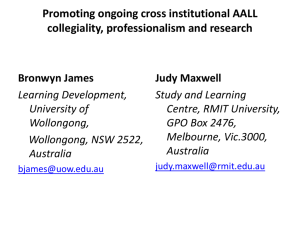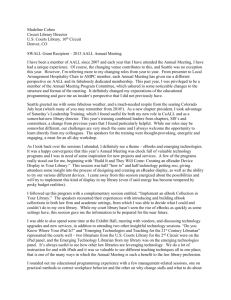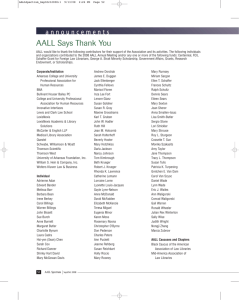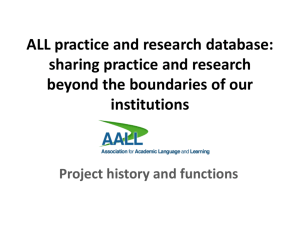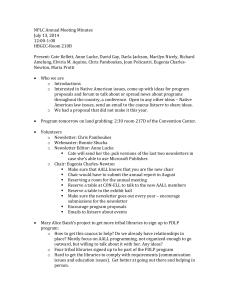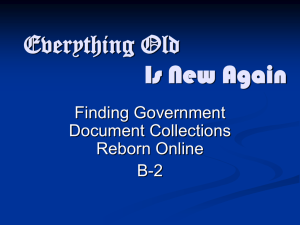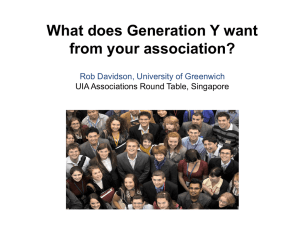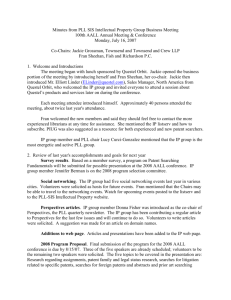P How Did They Do It? Time management, planning, and technology:
advertisement
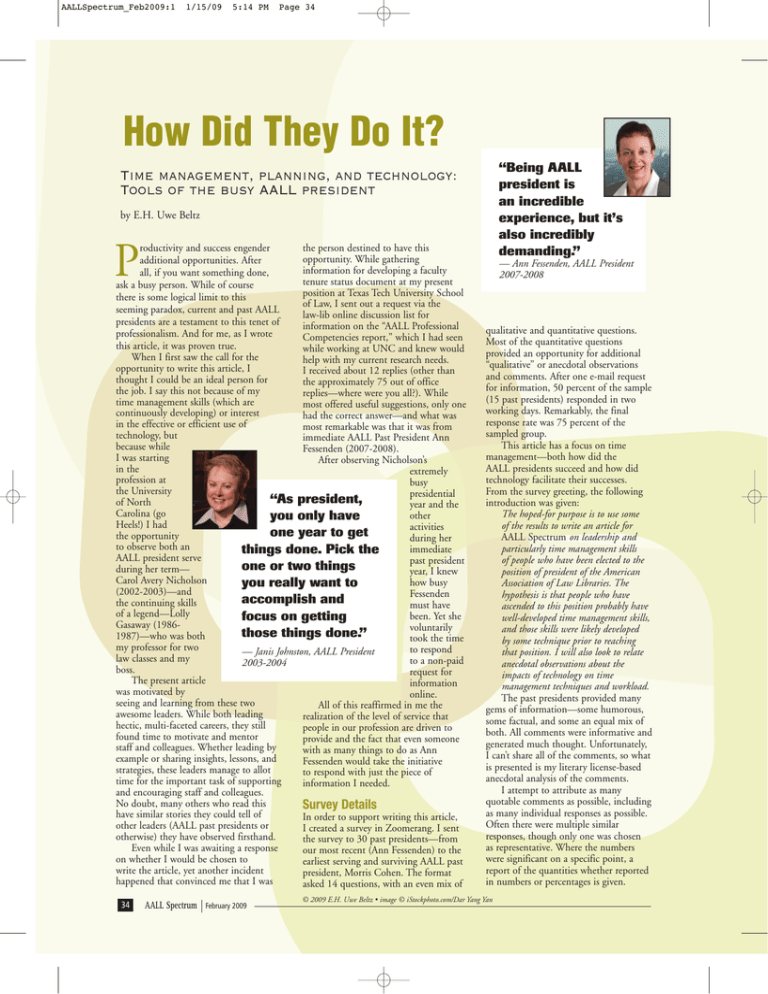
AALLSpectrum_Feb2009:1 1/15/09 5:14 PM Page 34 How Did They Do It? “Being AALL president is an incredible experience, but it’s also incredibly demanding.” Time management, planning, and technology: Tools of the busy AALL president by E.H. Uwe Beltz P roductivity and success engender the person destined to have this opportunity. While gathering additional opportunities. After information for developing a faculty all, if you want something done, tenure status document at my present ask a busy person. While of course position at Texas Tech University School there is some logical limit to this of Law, I sent out a request via the seeming paradox, current and past AALL law-lib online discussion list for presidents are a testament to this tenet of information on the “AALL Professional professionalism. And for me, as I wrote Competencies report,” which I had seen this article, it was proven true. while working at UNC and knew would When I first saw the call for the help with my current research needs. opportunity to write this article, I I received about 12 replies (other than thought I could be an ideal person for the approximately 75 out of office the job. I say this not because of my replies—where were you all?). While time management skills (which are most offered useful suggestions, only one continuously developing) or interest had the correct answer—and what was in the effective or efficient use of most remarkable was that it was from technology, but immediate AALL Past President Ann because while Fessenden (2007-2008). I was starting After observing Nicholson’s in the extremely profession at busy the University presidential “As president, of North year and the Carolina (go other you only have Heels!) I had activities one year to get the opportunity during her to observe both an immediate things done. Pick the AALL president serve past president one or two things during her term— year, I knew Carol Avery Nicholson how busy you really want to (2002-2003)—and Fessenden accomplish and the continuing skills must have of a legend—Lolly been. Yet she focus on getting Gasaway (1986voluntarily those things done.” 1987)—who was both took the time my professor for two to respond — Janis Johnston, AALL President law classes and my to a non-paid 2003-2004 boss. request for The present article information was motivated by online. seeing and learning from these two All of this reaffirmed in me the awesome leaders. While both leading realization of the level of service that hectic, multi-faceted careers, they still people in our profession are driven to found time to motivate and mentor provide and the fact that even someone staff and colleagues. Whether leading by with as many things to do as Ann example or sharing insights, lessons, and Fessenden would take the initiative strategies, these leaders manage to allot to respond with just the piece of time for the important task of supporting information I needed. and encouraging staff and colleagues. No doubt, many others who read this Survey Details have similar stories they could tell of In order to support writing this article, other leaders (AALL past presidents or I created a survey in Zoomerang. I sent otherwise) they have observed firsthand. the survey to 30 past presidents—from Even while I was awaiting a response our most recent (Ann Fessenden) to the on whether I would be chosen to earliest serving and surviving AALL past write the article, yet another incident president, Morris Cohen. The format happened that convinced me that I was asked 14 questions, with an even mix of 34 AALL Spectrum February 2009 — Ann Fessenden, AALL President 2007-2008 qualitative and quantitative questions. Most of the quantitative questions provided an opportunity for additional “qualitative” or anecdotal observations and comments. After one e-mail request for information, 50 percent of the sample (15 past presidents) responded in two working days. Remarkably, the final response rate was 75 percent of the sampled group. This article has a focus on time management—both how did the AALL presidents succeed and how did technology facilitate their successes. From the survey greeting, the following introduction was given: The hoped-for purpose is to use some of the results to write an article for AALL Spectrum on leadership and particularly time management skills of people who have been elected to the position of president of the American Association of Law Libraries. The hypothesis is that people who have ascended to this position probably have well-developed time management skills, and those skills were likely developed by some technique prior to reaching that position. I will also look to relate anecdotal observations about the impacts of technology on time management techniques and workload. The past presidents provided many gems of information—some humorous, some factual, and some an equal mix of both. All comments were informative and generated much thought. Unfortunately, I can’t share all of the comments, so what is presented is my literary license-based anecdotal analysis of the comments. I attempt to attribute as many quotable comments as possible, including as many individual responses as possible. Often there were multiple similar responses, though only one was chosen as representative. Where the numbers were significant on a specific point, a report of the quantities whether reported in numbers or percentages is given. © 2009 E.H. Uwe Beltz • image © iStockphoto.com/Dar Yang Yan AALLSpectrum_Feb2009:1 1/15/09 5:15 PM Page 35 Mixed Reviews on Technology I observed that even though many feel there is a benefit of technology, there is also a double-edged sword effect of technology. A series of questions focused on what tools the past presidents used for time management before, during, and after they were in the position. All but the latest three past presidents agreed that there is new technology now available that was not available to them while they served. “I use deadlines (self-imposed or otherwise) and to-do lists to manage procrastination.” — Carol Avery Nicholson, AALL President 2002-2003 When responding to the question of whether they would have been able to accomplish more with the new technology, some harkened back to a simpler time. Roger Jacobs (1981-1982) says that “the new tools are responses to a faster moving, more complicated society.” Jacquelyn Jurkins (1984-1985) points out that there was a much smaller Headquarters staff in the past. “[If ] e-mail had been generally available, that communication and dialogue would have been much easier,” she says. But Penny Hazelton (1990-1991) believes that e-mail allows contact regardless of “whether you are the right person or not,” illustrating the doubleedged effect of technology. No one respondent better acknowledged the dichotomy of technology’s effect than Mark Estes (1992-1993), who says that he wasn’t sure if technology would have made him more effective, since “[t]he PDA and applications digitize the Day-Timer, but I don’t think they save time.” Estes adds, that “[i]f the iPhone I am getting in the next couple weeks lives up to its hype, I would have been able to do more.” Tory Trotta (2004-2005) says, “Whoever invented the PDA should be awarded the Nobel Peace Prize.” Paper v. Electronic Speaking of high hopes, think of the hope for a paperless society. I know it is common to joke these days about how technology has only increased the volume of paper we use. In the results of the survey, I found further evidence of this reality. I asked about a whole range of time management tools used before, during, and after the experience of being an AALL president, including paper to-do lists, paper calendars, Day-Timertype planners, Outlook calendars and to-do lists, laptops, and the increasingly ubiquitous personal digital assistant (PDA). Eighty percent of all respondents still use paper to-do lists (I speculate those are significantly ingrained, easyto-use tools). Despite the phenomenal growth in the use of Outlook calendars by past presidents (250 percent increase), still 70 percent of the 20 respondents still use either a Day-Timer type planner or a paper calendar. And again, 70 percent includes many of the 15 respondents who at some time after their terms as president began to use some type of PDA. No matter how many extras there are in the Outlook programs, no matter how many new PDA improvements are made, the past presidents continue to rely on paper calendars and to-do lists, while no doubt printing out electronic versions too. Nature or Nurture? For those who aspire to leadership roles in AALL, regardless of your comfort level with technology, you will need to have some skills in the area of planning and time management. Responding to the question “Was time management and planning a natural skill for you, or, did you have to learn/apply these skills?” 14 claimed some level of “natural ability.” However, of those 14, there was a range of explanations for that “natural ability.” Whether it was learned from parents, from modeling others, or from management courses and workshops, even those who had natural ability recommended some planning). For each of those who made that distinction, the planning skill was noted as more natural ability, while time management was much more challenging. Lolly Gasaway (1986-1987) says it best: “It was a natural skill for me—I am a chronic list maker! But, I have taken several time management courses and workshops over the years, and they really help.” The lesson to be learned is that if you desire to lead successfully, you will need to acquire the time management and planning ability, whether naturally or through learning of some type, if you desire to succeed. The Power of Having a Goal For those who referred to specific experiences in their presidencies, the idea of finding and/or setting a reasonable goal to accomplish in the year of their presidencies was highly recommended. Margaret Leary (1988-1989) says that she focused on developing some kind of way of impacting national policy using the unique skills of law librarians, and that led a few years later to the AALL Washington Affairs Office. “As president, you only have one year to get things done,” says Janis Johnston (2003-2004). “Pick the one or two things you really want to accomplish and focus on getting those things done.” There seemed to be a cup-half-full/ cup-half-empty kind of way of looking at the experience of being president. Ann Fessenden says that “being AALL president is an incredible experience, but it’s also incredibly demanding.” Working Well with Others Apparently, once you get that focus on the projects to accomplish, and whether you have the above cup-half-full or cup-half empty outlook, almost all of the past presidents note the special nature of leadership in a volunteer organization like AALL. You are assured to be working with other people, whether by delegation or by depending on them to assist you “You can definitely (another cup-half-full/ cup-half-empty comparison learn from the could be drawn here). The leadership bottom line is that you need other AALL members to strengths and flaws of accomplish your goals. others. Enlist the help of “The lesson learned: set achievable goals and find colleagues you trust.” great people to help you,” — Sally Holterhoff, AALL President says Margaret Leary. 2006-2007 “You have to delegate.” There were no fewer than 15 other comments type of further honing or practice of the on delegation specifically, from having skills. to depend on others at the library where Several also delineated the time the president worked to cover the management skill from planning ability workload, to the more common (several associated list-making with dependence on colleagues in AALL. AALL Spectrum February 2009 35 AALLSpectrum_Feb2009:1 1/15/09 5:15 PM Page 36 Penny Hazelton states the bottom line in the form of a question: “Do you have to do this task, or could someone else do it instead?” She credited this question in part to her friend and colleague Don Dunn who died recently. She says he always had the seminal question: “What are you doing well that you do not need to do at all?” When you determine it does need to be done and can be done by others, Sally Holterhoff (2006-2007) notes, “You can definitely learn from the leadership strengths and flaws of others. Enlist the help of colleagues you trust.” Motivation through Delegation And the circle remains unbroken when you realize that in delegating you motivate or teach via experience. “I try to remember to delegate as a leadership development tool for “Do you have to do this task, or could someone else do it instead?” — Penny Hazelton, AALL President 1990-1991 others so they get experience,” says Carolyn Ahearn (1991-1992). The other side is that you often learn by seeking advice or consultation. Patrick Kehoe (1995-1996) says that a “good leader makes appropriate use of others’ skills and experience through…consultation.” Judy Meadows (1997-1998) says she turned to others inside and outside the profession, though she warns you have to be careful to avoid people who don’t admit they can’t do something. Being a strong advocate of the idea of applying learned lessons, I was impressed to see that several past presidents note how what they learned as volunteer leaders could be applied back to their library positions. Resisting the Urge to Procrastinate One final thought on time management, as I submit this article on the final day it is due, when I could not possibly put it 36 AALL Spectrum February 2009 off any longer: I have to agree—nothing works like a deadline (artificial or real). This line in the sand ultimately acts as the most useful motivator. When asked about procrastination and overcoming it, 11 of the 20 AALL past presidents say they had to overcome some level of procrastination. And, if you believe the thesis that the best way to get a job done is to find a busy person (AALL president—past or otherwise), apparently nothing frees them up more to tackle the next project than a deadline. So, I leave you with these final thoughts from 32 years worth of past leaders of AALL, on the topic of procrastination and deadlines: “This will be no easier tomorrow.” Jane L. Hammond (1975-1976) “Any delay in moving to accomplish a difficult goal will increase the challenges of success.” Roger Jacobs “I set a deadline when I take on a project.” Jacquelyn Jurkins “I often procrastinate because I want to limit the amount of time I spend on a particular task.” Penny Hazelton “If I find myself procrastinating, I tend to find more to do to lessen the procrastination.” Carolyn P. Ahearn “I use deadlines (self-imposed or otherwise) and to-do lists to manage procrastination.” Carol Avery Nicholson “Get a head start on those projects, reports, etc.…that are of real importance.” Janis Johnston “I tend to do the analysis and planning well in advance, even if the execution occurs somewhat closer to the deadline.” Tory Trotta “I think even the best organized of us have certain things we tend to avoid as long as possible…at least get started, which is often the hardest part.” Sally Holterhoff “Whoever invented the PDA should be awarded the Nobel Peace Prize.” — Tory Trotta, AALL President 2004-2005 Future Directions Writing this article revealed several psychological and business constructs that could be pursued in further research. The current data merely scratches the surface in addressing the attributes of our successful leaders. In addition, the present research results provide a rich set of data in comparing librarian leaders to other types of leaders. Conclusion The present study reaffirmed the level of service that people in our profession are driven to provide. A sincere acknowledgement to all those who have blazed trails, led the way for us to be where we are as an organization. And, from the author, thank you so much for sharing your experiences with us. You are truly the best of the best, the busy person whom we can always call on from your busy schedule to help us out, whether it is leading the organization into the future or taking the time to answer a law-lib discussion question or a survey that enlightens the rest of the organization. Future leaders thank you for your example and for your time. ■ E.H. Uwe Beltz (uwe.beltz@ttu.edu) is associate director for law library and computing at Texas Tech University School of Law Library in Lubbock. “Any delay in moving to accomplish a difficult goal will increase the challenges of success.” — Roger Jacobs, AALL President 1981-1982
